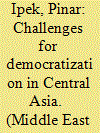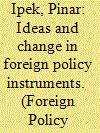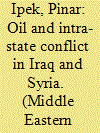| Srl | Item |
| 1 |
ID:
077075


|
|
|
|
|
| Publication |
2007.
|
| Summary/Abstract |
The agenda of post-communist transformation seemed to have faded away in Central Asian countries until the tragic terrorist attacks of September 11, 2001. In the aftermath of the Iraq War, democratization in "failed" and authoritarian states has rapidly become the focus of U.S. foreign policy. Since the events in Kyrgyzstan, Central Asia has been added to the debate on third-wave democratization that has been witnessed in Georgia and Ukraine. In light of the increasing turbulence in Iraq and the unexpected death of Turkmenistan's President Niyazov, the challenges for democratization in Central Asia should be reevaluated. This article argues that the prospects for democracy in that region are vulnerable to internal and external actors as well as structural problems in the individual states, which possess vast energy resources and crucial routes for exporting them. Thus, to avoid the error of coddling dictators to serve its agenda, the United States should consider developing a longer-term policy that takes into consideration not only the strategic importance of Central Asia, but also the development of its civil society
|
|
|
|
|
|
|
|
|
|
|
|
|
|
|
|
| 2 |
ID:
137710


|
|
|
|
|
| Summary/Abstract |
Constructivism in the International Relations literature mainly focuses on the constitutive interaction between international norms and state actions. Few studies explore when ideas at the domestic level matter in foreign policy change. I propose a constructivist account for policy change that emphasizes not only ideas but also material interests as exogenous factors constituted within domestic structures. My empirical analysis in the case of the Turkish International Cooperation and Development Agency reveals important evidence demonstrating the influence of (i) shared normative values, mostly constituted by the foreign policy elite's intersubjective understanding of Turkey's historical roots and cultural ties in the region and (ii) material interests, favored through the “trading state” and framed by the convergence of principled and causal beliefs on policy change. Ideas matter in foreign policymaking when a set of contingent conditions is satisfied: (i) A small group of recognized foreign policy elite has shared normative beliefs and (ii) an enabling political environment exists, particularly a majority government facilitating foreign policy appointments to key positions so that a window of opportunity is provided for policy entrepreneurship.
|
|
|
|
|
|
|
|
|
|
|
|
|
|
|
|
| 3 |
ID:
151862


|
|
|
|
|
| Summary/Abstract |
The continuing dependency on fossil fuels of the Middle East not only in Turkey's energy mix but also in world energy demand requires further analysis of oil and conflict in the region since the fall of Mosul in Iraq to the Islamic State of Iraq and Syria in June 2014. This article addresses the relationship between oil and conflict. Then, it examines the case of Turkey's increasing energy relations with the Kurdistan Regional Government to elucidate the implications of inter-state and intra-state conflict on regional interdependence in the region. The argument asserts that risks of an abrupt regime change or revolutionary regime formation in the aftermath of civil war in Syria and ethnic or sectarian violence in Iraq, which are highly associated with intra-state conflicts, present challenges for Turkey's energy security and most importantly for human security in the region.
|
|
|
|
|
|
|
|
|
|
|
|
|
|
|
|